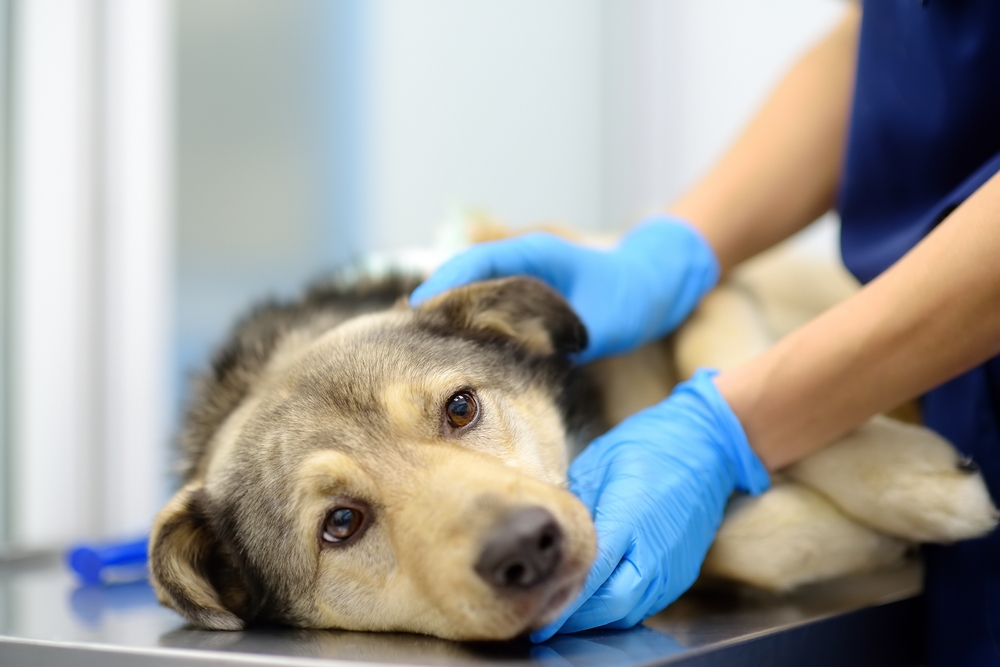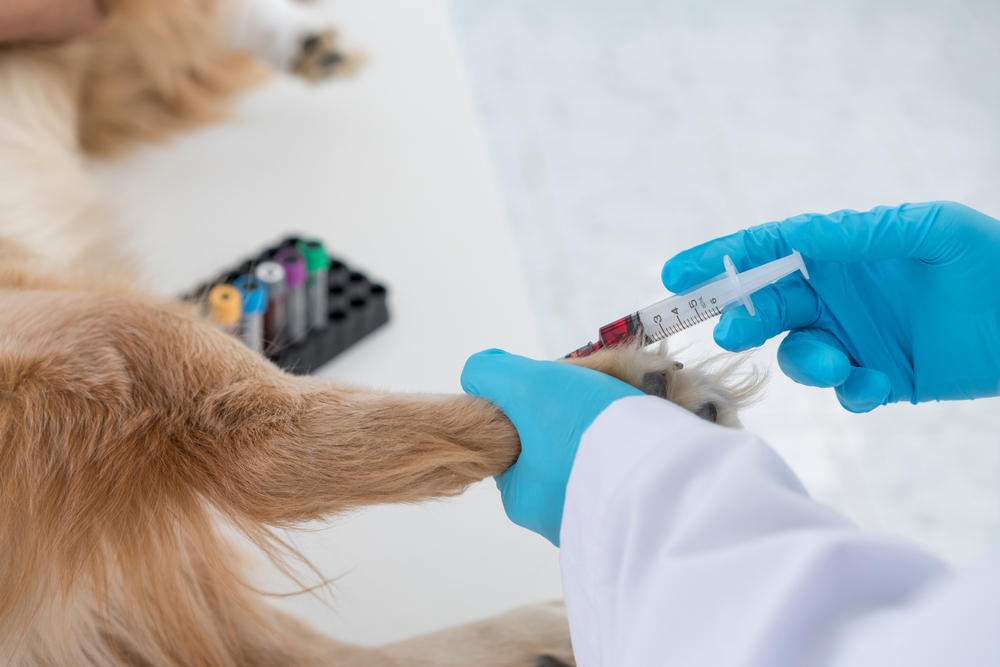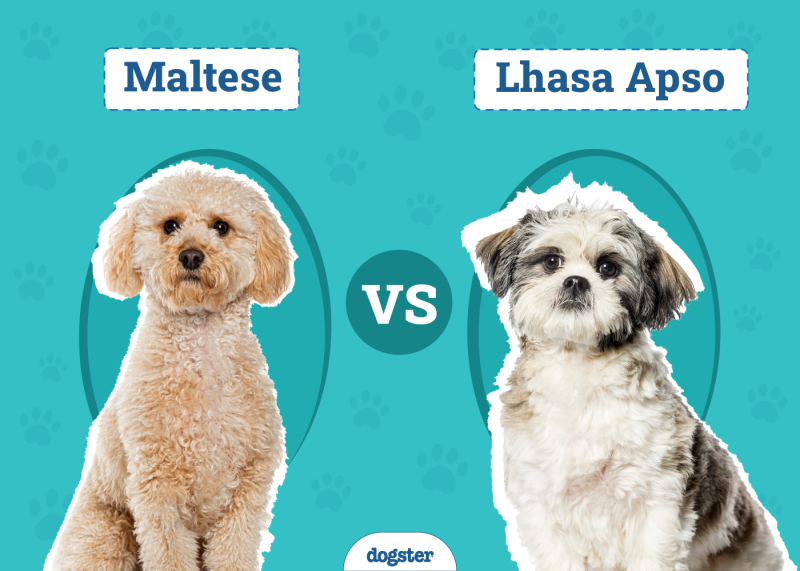In this article
View 5 More +Canine distemper virus (CDV) is one of the most widespread infectious diseases in the world, and it is one that your dog shouldn’t be infected by. This potentially deadly virus affects multiple organ systems, so produces a wide range of clinical signs, making it difficult to recognize in its early stages. Young pups and immunocompromised dogs are the most vulnerable to infection, but vaccination is highly effective.
So, why are dogs still getting distemper? As we’ve seen with viruses like measles, when infection rates go down, people tend to become less concerned about the risks and consequences of infection, and vaccination rates drop. When this happens, those viruses experience a resurgence, and this is something that periodically occurs with diseases like canine parvovirus (CPV) and CDV.
Let’s take a closer look at CDV, including what sort of clinical signs to be on the lookout for, how the virus is treated, and how we can protect our dogs from this deadly disease.

What Is Distemper?
Canine distemper virus (CDV) is one of only a few viral infections that are found in dogs worldwide, with case numbers waxing and waning over the years. It is a member of the paramyxovirus family, which includes human measles. It is a highly contagious virus that is spread through direct contact with infected animals, aerosolized viral particles, and bodily fluids. In some cases, infected animals can shed the virus for several months, and infected mothers can pass the infection to her unborn pups.
The virus affects domestic dogs and a large number of wild carnivore species, including foxes, wolves, ferrets, skunks, minks, raccoons, badgers, and large cat species. Interestingly, domestic cats appear to be unaffected by CDV.
Initially, the virus enters the lymphatics of the respiratory system, where it replicates and attacks the immune system. It then spreads through the respiratory tract, gastrointestinal tract, and nervous system.
Some dogs will recover with little or no medical treatment, while others require intensive management in a hospital. CDV carries a high rate of mortality, with around 50% of adult dogs succumbing to the infection and an 80% fatality rate in puppies.

What Are the Signs of Distemper?
Dogs usually develop a fever within a few days of becoming infected with CDV, with clinical signs emerging as different organ systems are affected. The severity of these signs varies depending on the viral load and immunity of the individual, but will typically include:
- Discharge from the eyes and nose
- Fever
- Coughing
- Lethargy
- Reduced appetite
- Vomiting
- Diarrhea
As the virus progresses, neurological signs emerge, including:
- Circling, head tilt, and ataxia (incoordination)
- Muscle twitches
- Tremors, jaw champing, and seizures
- Partial or total paralysis
CDV was formerly known as hard pad disease, as some dogs will also develop thickened, hard skin on their nose and paw pads.
If you are concerned about the health and well-being of your pet, seek veterinary advice for the best course of action.
If you need to speak with a vet but can't get to one, head over to PangoVet. It's our online service where you can talk to a vet online and get the advice you need for your pet — all at an affordable price!
How Is It Diagnosed?
Diagnosis is often delayed in CDV cases, as the early stages mimic a wide range of infectious diseases, with some being quite innocuous. Once distemper is suspected, the preferred diagnostic test involves a viral PCR or polymerase chain reaction (a laboratory test used to identify viral DNA or RNA) using blood or swabs of conjunctiva or mucosa (eyelids and mouth). There are also blood tests that identify distemper antibodies in the blood, but this can also produce a positive result in dogs that have been vaccinated against distemper, so PCR is the preferred method.

How Is Distemper Treated?
Being a viral infection, there is no specific treatment for CDV, with supportive care being the mainstay of patient management. Intravenous fluids to support organ systems and correct dehydration, antibiotics to treat or prevent secondary bacterial infection, and medications to manage vomiting and diarrhea will be used to address clinical signs as they appear.
Distemper Prevention
Alongside canine parvovirus (CPV) and canine adenovirus, CDV forms one of the core vaccinations for dogs and has an efficacy of more than 99%. This means that vaccination successfully prevents infection with the distemper virus in over 99% of dogs, making CDV a preventable disease.
As with any vaccination, there are risks inherent in vaccinating dogs against distemper, but a look at the statistics shows us how insignificant those risks are when compared to the risks associated with not vaccinating.
- Risks of adverse reaction to vaccine*: 4% (13 reactions per 10,000 dogs)
- Efficacy of vaccination: >99%
- Mortality rate of CDV: 50-80%
*Adverse reactions include vomiting, lethargy, swelling, pain, hives, fever, breathing difficulties, and collapse.
Being readily transmitted between animals, it is important to keep your unvaccinated pup away from any other dogs and wild animals until they have received their complete vaccination course. As numerous wild animal species can carry and spread the disease, CDV will likely never be eradicated, but vaccination can keep our pets safe.

Frequently Asked Questions (FAQ)
Can Other Pets Get Distemper?
Yes. Ferrets are at particularly high risk of infection from CDV, with a 100% mortality rate. Fortunately, like dogs, they can be vaccinated against the disease.
Feline panleukopenia virus, which is also known as feline enteritis or feline parvovirus, is sometimes erroneously referred to as feline distemper but is not a true distemper virus. Large felid species can become infected with CDV, but domestic cats are not at risk of infection from contact with infected dogs. At this stage, the susceptibility of hybrid cat breeds (e.g., Ocicats or Savannah cats) is not completely known, so caution should be exercised.
If you have any unusual exotic pets, talk to your vet about their distemper risk and prevention options.

Can I Catch Distemper From My Pet?
No. Fortunately for us, CDV does not infect humans. However, some of the clinical signs of rabies are similar to those of distemper, so extreme care should be taken with dogs suspected of infection with CDV until rabies is ruled out.
This is, however, an area that scientists are monitoring closely, as some primates have become infected with CDV, and its close relationship with the human measles virus could potentially allow for some cross-reactivity.
Is Canine Distemper the Same as Cattle Plague?
Rinderpest, sometimes referred to as cattle plague, is a highly contagious mucosal disease seen in ruminants like cattle. Although both distemper and rinderpest are paramyxoviruses, cattle cannot become infected by dogs, or vice versa.

Summing Up
Canine distemper virus is a highly contagious, deadly, and almost entirely preventable infection that affects dogs around the world. With numerous wild animal species able to spread the disease to our pets, it is vital that we protect our dogs through vaccination; there simply is no excuse for dogs to become infected and die from distemper.
If you aren’t sure if your dog is fully protected, do not hesitate to get in touch with your vet.
Featured Image Credit: Elayne Massaini, Shutterstock





















